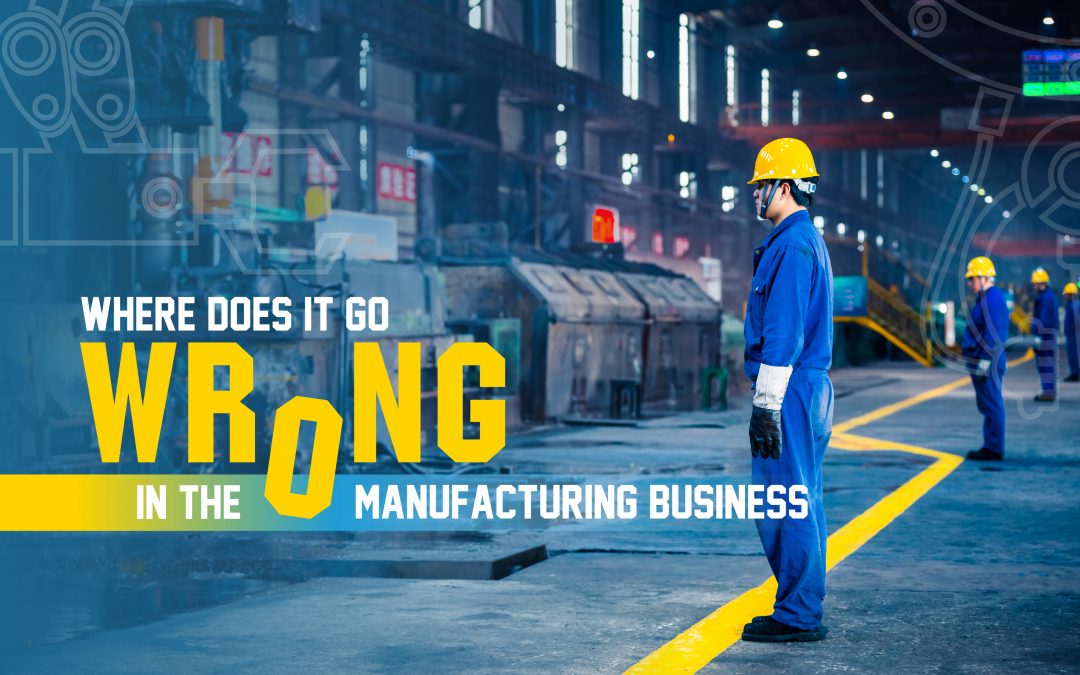The manufacturing sector is crucial for driving economic progress, innovation, and job creation. Yet, despite its importance, many manufacturing businesses face significant challenges that can hinder their success. Understanding where things often go wrong is essential for overcoming these hurdles. Here’s a comprehensive look at common pitfalls in the manufacturing business:
1. Inadequate Supply Chain Management
Efficient supply chain management is critical to maintaining the flow of materials and products. Inefficiencies or disruptions in the supply chain can lead to delays, increased costs, and unmet customer demands. Businesses must invest in robust supply chain strategies and build strong relationships with suppliers to ensure timely delivery and cost control.
2. Poor Store Maintenance (Raw Material & Finished Goods)
Effective store maintenance is crucial for managing both raw materials and finished goods. Poorly managed storage can lead to spoilage, damage, and inventory discrepancies. Proper storage practices, regular inventory audits, and effective warehouse management systems can help ensure that materials are kept in optimal conditions and that finished goods are readily available for shipment.
3. Procuring the Right Raw Material at the Right Place, Time, and Price
The procurement of raw materials is a critical aspect of manufacturing. Sourcing materials at the right place, time, and price can significantly impact production efficiency and cost. Procurement strategies should include evaluating suppliers, negotiating favorable terms, and ensuring a steady supply of high-quality materials. Missteps in procurement can lead to production delays and increased expenses.
4. Ineffective Job Order Management
Job order management involves planning, executing, and monitoring production orders. Inefficiencies in job order management can result in delays, increased costs, and poor product quality. Implementing a robust job order system and regularly reviewing production schedules can help streamline operations and ensure that orders are completed on time and within budget.
5. Lack of Quality Control
Quality control is essential for maintaining product standards and customer satisfaction. Inconsistent quality can result in product recalls, customer complaints, and damage to brand reputation. Investing in quality assurance processes and technologies can help prevent defects and ensure products meet required specifications.
6. Insufficient Investment in Technology
Modern technology plays a vital role in manufacturing efficiency. Failure to invest in advanced manufacturing technologies like automation, robotics, and the Internet of Things (IoT) can lead to reduced productivity and competitiveness. Upgrading equipment and adopting new technologies are crucial for staying ahead in the industry.
7. Inefficient Production Processes
Inefficient production processes can lead to waste and increased costs. Implementing lean manufacturing principles and continuously optimizing workflows can help improve efficiency and reduce operational expenses. Regularly reviewing production processes is essential for maintaining optimal performance.
8. Poor Financial Management
Effective financial management is key to maintaining profitability and stability. Poor budgeting, pricing strategies, and cost control can lead to financial instability. Implementing sound financial planning and regular audits can help manage costs and ensure financial health.
9. Lack of Skilled Workforce
A skilled workforce is essential for operating complex machinery and ensuring high-quality production. A shortage of skilled labor can result in increased errors and reduced productivity. Investing in workforce training and development is crucial for maintaining a competent and efficient team.
10. Ignoring Market Trends and Customer Needs
Manufacturers must stay updated on market trends and customer needs to remain competitive. Ignoring these factors can lead to producing outdated or unwanted products. Understanding consumer behavior and market dynamics is essential for developing relevant and in-demand products.
11. Regulatory Compliance Issues
Adherence to regulatory compliance is crucial for avoiding legal penalties and ensuring product safety. Manufacturers must stay informed about industry regulations and implement necessary changes to comply with environmental, safety, and quality standards.
12. Ineffective Leadership and Management
Leadership impacts every aspect of a manufacturing business. Ineffective leadership can result in poor decision-making, low employee morale, and operational inefficiencies. Strong leadership that fosters a clear vision and promotes continuous improvement is essential for business success.
13. Overlooking Environmental and Sustainability Concerns
Sustainability is increasingly important in the manufacturing sector. Companies that fail to adopt green manufacturing practices may face consumer backlash and regulatory issues. Implementing sustainable practices and reducing environmental impact are essential for long-term success.
14. Training Floor Employees
Proper training of floor employees is crucial for ensuring efficient and safe operations. Inadequate training can lead to errors, accidents, and decreased productivity. Investing in comprehensive training programs helps ensure that employees are skilled and knowledgeable about their roles and responsibilities.
15. Payment Terms & Collection
Effective payment terms and collection strategies are important for maintaining cash flow and financial stability. Poor management of accounts receivable can lead to delayed payments and financial strain. Establishing clear payment terms, monitoring collections, and following up on overdue accounts are essential practices for managing finances effectively.
Conclusion
Navigating the complexities of the manufacturing business requires addressing a range of challenges. From supply chain management and store maintenance to job order management and financial practices, identifying and addressing these common pitfalls can significantly enhance operational efficiency and business success. By focusing on these areas and employing best practices, manufacturers can improve performance, reduce costs, and achieve long-term growth.












